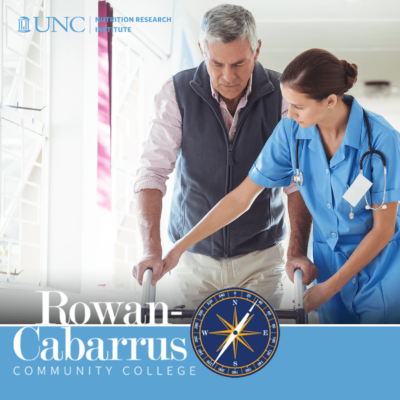The UNC Nutrition Research Institute (NRI) is proud to partner with Rowan-Cabarrus Community College (RCCC), a fellow North Carolina Research Campus (NCRC) institution, to bridge a crucial gap in healthcare education—nutrition. This effort highlights the importance of the NCRC as a hub for nutrition science collaboration. This partnership came about after recognizing a significant lack of nutrition concepts in nursing and other healthcare profession programs, a challenge that is not unique to RCCC but prevalent across the healthcare education field. Pioneering research from former NRI scientists Martin Kohlmeier, MD, PhD, and Steven H. Zeisel, MD, PhD, highlighted this gap years ago, and this collaboration seeks to address it directly.
The goal of this partnership is simple but significant: to provide RCCC nursing students with critical nutrition education through a series of guest lectures from NRI faculty. These lectures cover key topics related to the role of nutrition in patient care, providing students with the knowledge they need to integrate nutrition into their future practice and ultimately improve patient outcomes. Several NRI scientists have given lectures, and there are plans for more in the coming semesters. This effort seeks to help nursing students better understand the nutritional needs of their future patients, equipping them to make informed decisions that contribute positively to the health of the communities they serve.
Blake Rushing, PhD, NRI principal investigator and guest lecturer, provided a lecture on drug-diet interactions, an essential area that explores how nutrition can alter the effects of medications, and vice versa: “I’m so excited to have had the opportunity to give this lecture and contribute to our partnership with RCCC. The nursing students were very interested in these topics and were highly engaged in discussing how these concepts can be used to help guide patient care. It is incredibly important for our healthcare professionals to be equipped with nutrition knowledge so that they can inform patients how they can best modify their lifestyle to optimize treatment and care.”
NRI Interim Director Deborah Tate, PhD, another guest lecturer in the series, spoke on Assessing Nutrition and Health Behaviors for Disease Prevention, providing insights that emphasized the role nurses can have in encouraging small, but impactful, changes to nutrition, physical activity, or sleep that can improve their patients outcomes. “This partnership has had great energy in its early phase. It utilizes the deep knowledge and expertise of faculty at the NRI and other institutes working in the nutrition field at the NCRC to enhance the nursing education offered by RCCC,” Tate explained. NRI faculty are not only scientists but professors at UNC-Chapel Hill. This venture allows them to reach more students across North Carolina. Tate shared, “Working with nursing students this semester was a wonderful exchange. They asked great questions and shared many ideas about how making small behavior changes could help their patients across a range of diseases. I hope they learned something; I know I learned from them.”
Susan Sumner, PhD, an NRI principal investigator, played a key role in initiating the partnership with RCCC, and will be presenting in an upcoming semester on how nutrients are utilized for a healthy biochemistry. Her efforts have been instrumental in bridging the gap in nutrition education and launching this collaboration. “I was delighted to work with Carol Spalding, EdD, President of RCCC, and Emily Fink, DNP, RN, Director of the RCCC Nursing Programs, to develop a series of lectures that will advance nutrition education in the nursing program. I am inspired by the numerous NCRC faculty who have offered to contribute to this new initiative, demonstrating their passion for improving nutrition in our community and beyond,” said Sumner.
Other NRI faculty members, including Katie Meyer, ScD have also been involved in this ongoing effort. Meyer’s lecture, Nutrition Myths and Misconceptions, provided nursing students answers to common misunderstandings in nutrition. The lecture series has been well received and the collaboration is expected to continue expanding over time. With such diverse expertise being shared, RCCC nursing students are gaining a richer understanding of how nutrition directly influences patient care and overall health. This partnership reflects the NRI’s commitment to applying nutrition research to address real-world health needs.
As this relationship grows, NRI and RCCC are eager to see how integrating nutrition into nursing education will improve healthcare delivery in our local community and beyond. This partnership marks an important step towards ensuring that healthcare professionals are equipped with the comprehensive knowledge they need to improve the well-being of their patients.

